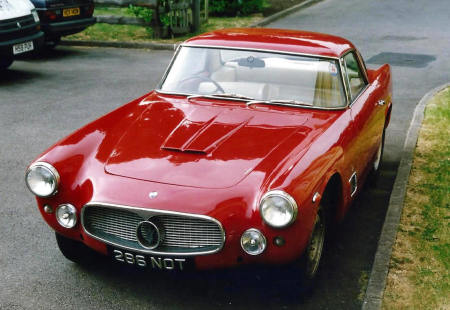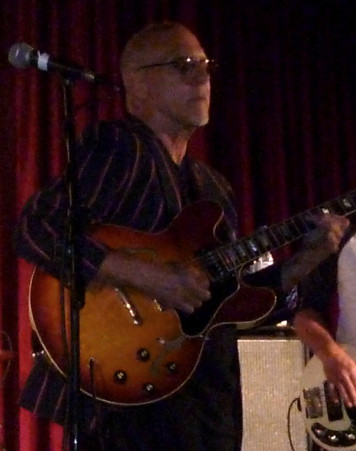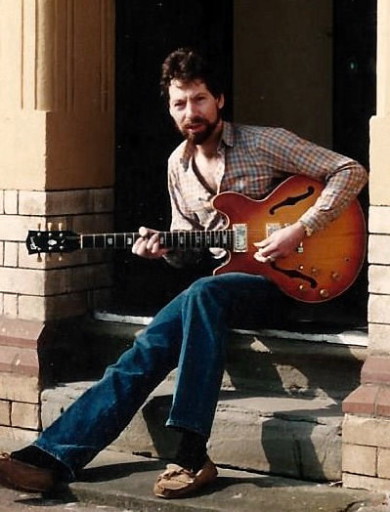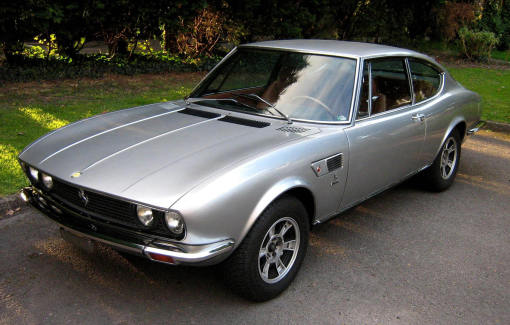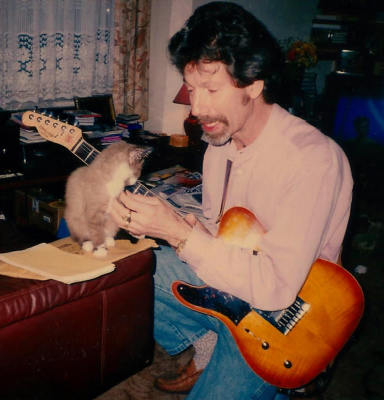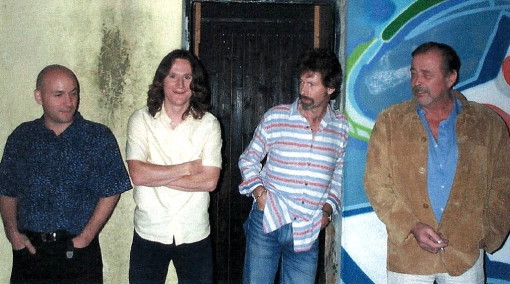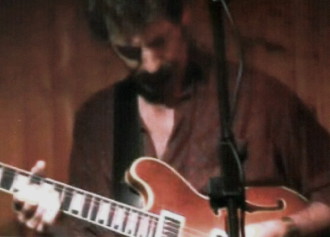
My Welsh Roots (part 2)
As the 1980’s drew to a close, musical activity had to be put on the back burner for a while because I had decided to put my flair for driving to good use by becoming an instructor. Cars, rather than guitars, took priority for a few years. Most of my spare time was spent doing restoration work on the Maserati 3500GT that filled the garage whilst a BSM Metro served as both workhorse and run-about. The Maserati was drivable, but the engine (the expensive bit) smoked heavily and made strange ominous noises. A complete overhaul was badly needed. I decided to save money by doing as much as possible myself, and at this stage the only expense was the hire of a hoist. Before taking the engine out I used the hoist to remove the cylinder head, a task that could have otherwise involved unlimited hours of frustration. Next was the gearbox and clutch (from inside the car on this model) and then the cylinder block. I had never attempted major work like this before, but it was all mercifully easy compared to what it would have been on most cars.
Once I had dismantled the engine in the kitchen (this was before I got married!), it was obvious that serious money would have to be spent to sort it out. Some goon must have stripped this engine down before, and rebuilt it blindfolded, because some of the bearings had been fitted the wrong way round. The crank journals looked totally knackered. But many months and £5k later, I plonked the engine back in and it looked and sounded the business. The paint had also been redone, in a rich pillar-box red colour. Finally, after work on brakes and steering, it passed the MOT. The restoration was far from complete though, and I had run out of money, so ..... regrettably it had to be sold. My consolation came in the form of a 1971 Fiat Dino 2.4 coupe, a cheaper, more usable GT that offered exhilarating fun and lovely exotic noises, thanks to a Ferrari V6 under the bonnet. The original Maserati crankshaft (all 98 lbs. of it) still rests hidden away in our (unrestored) kitchen!
But despite the distractions of career, Dino and family, thoughts of music were always simmering away in the background. The buzz of ‘live’ gigs was an important element missing from life. I had learned by now that it was unrealistic expecting to make any money this way, so I decided to team up with good friend and colleague from up the road, Rob Haddon, to do something a bit different and more adventurous ..... just for the hell of it. Rob’s musical background was mainly jazz-based, and he was (and still is) an exceptional guitarist.
We are both big fans of jazz-fusion players such as Larry Carlton and Lee Ritenour, so we cobbled together a collection of instrumental pieces by these, and other major artists including ‘70’s band The Crusaders and jazz great George Benson, to create a project we called ‘Panacea’. Drummer Vince Roles, bassist Eddie Trench, and a young keyboard player, Ian Maggs, completed the line-up. The material we chose was complex, but manageable. We spent a few weeks practising and arranging the tunes before any rehearsals, which had to be done in a hired room up three flights of stairs. As we lugged the gear up the stairs one day, we were assailed by a frightful racket reverberating from one of the lower rooms. The guy in charge said it was the Manic Street Preachers. I thought ‘who the hell are THEY?’ This was 1994.
I recorded the two rehearsals that we did, and knocked up a rough ‘demo’ tape. It was littered with minor mistakes, but good enough to give a true impression of the band and the music. First port of call was a promising nearby venue off the Lavernock Road called the ‘Blue Dolphin’. I dropped by there one night and spoke to the guy in charge, a flashy London geezer called Andreas. We chatted for a while and he seemed pretty interested in giving us a gig, so I left him a tape, cautiously optimistic that I would soon get a call.
Three weeks passed by without hearing anything, so I decided to pay him another visit. He looked at me accusingly and said “You lifted all those tracks off records!” I was completely flummoxed by this and tried to explain they were from a rehearsal we had done. He was having none of it. He immediately said “When I listened to it on headphones I could hear the sound of the needle dropping onto the disc”. There was this sudden sickening moment when I realised he was dead serious. I couldn’t believe my ears. I challenged him to come to one of our up-and-coming gigs, but I was wasting my breath. He was adamant, in spite of the obvious mistakes on the recordings. I turned and walked out, stunned by a mixture of disgust and disbelief .... disgust at his monumental arrogance, and disbelief that individuals like that really exist. In a way, his assertions were a back-handed compliment to the band, but it was nevertheless a very disturbing encounter. I never went near him again and, hopefully for the residents of South Wales, this obnoxious philistine has disappeared from these parts, never to return.
Anyway, in March of '94, we did our first gig, at the Inn on the River. There was a moderate crowd, with a few musician friends present. Whether their motive was giving moral support, or simply down to curiosity, I’m not sure. The first tune went Ok, although the adrenaline caused us to ‘rock it up’ a bit too much, maybe. The second tune was a tricky number that Rob had written called ‘Over the Moon’. We were cruising through that one just fine until suddenly, midway through, we hit severe turbulence in the form of what can best be described as ‘catastrophic rhythm-section failure’ ..... a band’s worst nightmare. We had ‘lost it’ in spectacular fashion while I (poor devil) was playing my solo. If this had been a rehearsal we would have just ground to a halt and started again. But in a ‘live’ situation we had to carry on no matter what, and just try to get things back under control. Drummer Vince manfully ploughed on through the chaos and collateral damage, and probably saved us from embarrassing disaster. We staggered and stumbled for what seemed like an eternity before finally regaining some semblance of shape, and collapsing over the finishing line.... Phew! We all had a good gulp of our pints after that one! The rest of the set fared much better, but this (thankfully rare) incident is a reminder of a golden rule for amateur bands and jammers, and that is: If you start the number well and finish it in style, you can usually get away with all kinds of calamities during the middle bit ..... usually!
Being a purely instrumental band, Panacea didn’t get many gigs. We did odd ones here and there, which ‘cleaned up’ the set considerably before eventually appearing at Cardiff’s foremost jazz venue, the Four Bars Inn, opposite Cardiff Castle. The jazz fraternity was the only realistic outlet for our type of material. We played there three times in as many months, to decent crowds who enjoyed what we did. It was a change from the more mainstream stuff that jazz combos usually dish up. This could have continued indefinitely but, as so often happens, fate intervenes in some way and spoils the party. Keyboard player Ian had to relocate to Swansea due to a job transfer and, about the same time, Vince decided to cash in by joining local soul band Madassa.
Rob and I did manage to resurrect Panacea the following year with a new drummer and bass player, but the ever-present problems of nailing down gigs and maintaining a fixed line-up always conspired against us. But, all things considered, it was well worth it. Playing jazz-funk was a terrific buzz. Our high point was being able to do a more-than-presentable version of Lee Ritenour’s classic ‘Dolphin Dreams’, my choice as the best tune I’ve ever played. Close in second place is ‘Last Nite’ by Larry Carlton.
After Panacea, the focus was mainly on family and work for the next few years. Being able to jump aboard the Fiat Dino and bomb off on a family trip or holiday was a frequent highlight. Even a short trip to the local petrol station felt like a special occasion. People would often hear this silver Armani-suit-on-wheels with its growling thoroughbred V6, and simply wonder what it was they were looking at. I made numerous long solo journeys in the Dino, but it was never a lonely experience. The symphonic mechanical soundtrack from that jewel of an engine was just fantastic, providing relentless aural excitement and a cosy feeling of companionship, in one of the most stylish wood-and-leather interiors I’ve ever sat in. I never felt alone, even on the occasions when it broke down, which it did on a number of occasions. But it was always worth the pain for the pleasure.
It was the late 90’s before music was back on the agenda. Following the impracticalities of a project like Panacea, I figured it might be time to go back to my roots and do a bit of Blues. I had a close encounter with Tom Riley, well-known drummer and leader of veteran Cardiff band Red Beans and Rice. Tom was thinking along similar lines and had a rock-solid partnership with bass player Ben Herbert, whom I much admired. He gave me a cassette tape of about forty short, tightly-arranged tracks of the stuff he fancied doing.
Tom, being a stickler for detail, liked to keep to the script. This was somewhat in conflict with my feeling that Blues should be more about instinct and improvisation. The type of material wasn’t really what I had in mind either. And the clamour of alarm bells rose a few more decibels the moment I realised that the other guitarist involved, though knowledgeable on chords etc., had absolutely no feel for blues lead guitar. So he and I didn’t team up, but this episode did nothing whatsoever to diminish my admiration for Tom, who was straightforward and genuine, both in his drumming style and as a person. He is now retired.
But things did finally begin to fall into place around the summer of ’99. I had just swapped my custom-built 70’s John Birch guitar for a nice 3-pick-upTelecaster built by a guy in West Wales called Dave Copeland. I had hardly used the JB since buying a Gibson 335 in 1980, and fancied something with a totally different sound. But, having no band at the time, I couldn’t try it out properly. I happened to bump into Cal Newman in Cardiff city centre one afternoon and we had quite a long chat. Our paths hadn’t crossed during the decade or so since I last played with him, but it was like old times. Cal was doing his solo gigs and had a few lined up, as usual. I told him about the Tele’ and suggested we do one of his solo gigs as a band gig instead (without payment). Our old bass player from the Muddy River Band, Nigel Philp, was willing to help out, and he knew a spare drummer, Jon Steele, who was recuperating from a less-than-happy stint with Welsh guitar legend Mickie Gee. Cal agreed to give it a ‘go’.
By the start of 2000, Cal, Nigel and I had teamed up with Jon Steele to form the Muddy River Blues Band. Our mission was to just play authentic urban Blues, as opposed to the more varied catalogue of the 80’s period. We decided to hand-pick relatively unknown songs that hadn’t already been done to death by other blues bands. There wuz gonna be no room for hoochie coochie men, stormy Mondays or bad signs to be born under in our set! I, for some reason, fancied doing a bit of lead vocals, something I had tried years earlier with unspectacular results. My voice is only just good enough for the odd backing vocals here and there but I figured, with Blues, it’s more about the phrasing. Cal seemed quite happy to go along with this, and even made encouraging comments, though that may have just been to avoid having to learn lyrics to a load of new songs!
Anyway, the problem, as always, was to find a venue where we could play and tighten up the set. I managed to find a pub off the Newport Road called The Yellow Kangaroo, which was willing to have us on Monday nights for a trial period that ended up lasting two years. We decided to call these Monday gigs the ‘Blues Workshop’, with the intention of attracting other blues guys to get up and join the party. This worked very well, and added variety to the proceedings. For me, these early few weeks felt like a new dawn. I was using the ‘new’ Telecaster through my usual Music Man amp, and discovering gutsy blues tones that I had never experienced before. I needed to adapt my way of playing to exploit these new sounds, but it was great to be back playing The Blues.
Before very long, Cal started to get us gigs in other venues around Cardiff, most notably the ‘Blues Dragon’ in Cathays. From there we quickly graduated to the most prestigious Welsh blues venue, the Tawe Delta Blues Club, in Swansea. This was run by Terry Williams, a Swansea-born drummer most renowned for his lengthy spell with Dire Straits. Since retiring from regular performing (his knees had gone, he told me), he and his wife Louise (‘Lou’) decided to give the Welsh music scene a huge boost by setting up a club designed to attract blues artists from the USA, as well as local acts such as us. Our first gig there was very well received, and Terry soon had us back for a couple more before the summer was out.
By this time, there had been a change of personnel in the band. Nigel and drummer Jon Steele had been beguiled and led astray by the hype (the polite word!) of a guy we all knew who fronted another local blues outfit called Blues Central. Somehow, Tom Riley must have caught wind of this development, because I had a call from him a week or so later offering to be our new rhythm-section (with Ben Herbert on bass). This I was very keen to accept, but Tom immediately ruled out the idea when I happened to mention Cal’s policy of taking the lion’s share of any gig money. Tom, in spite of being a leader and figurehead of his various bands, always stuck to the principle of sharing out the money equally.
Before long, my search for a new bass player had coughed up a young Frenchman by the name of Nic Davalan. Nic was a clever guy, fluent in four languages and (more importantly) a very tidy player. An added bonus was that he knew a spare drummer, Meirion Sampson, who had recently done gigs with him. Neither were battle-hardened blues veterans, but they settled in just fine. Cal and I managed to keep the ‘Workshop’ nights going during the change-over, with a little help from various bluesy friends. We were getting quite a variety of people ‘guesting’ ..... vocalists, guitarists, harmonica players, sax players, and even an accordion player (pianist Steve Hawkins) on one occasion. Steve currently plays in Cardiff band ‘Fun House’. Other notable guests include singer Kenny Driscoll and guitarist/singer Pete Matheson, who both added a genuine touch of class.
Within a year or so, the Muddy River Blues Band had gained an enviable reputation. Terry Williams intimated to Cal and me one night that we were the Tawe Delta’s favourite Welsh blues band during our two years together. We played there seven times. I attribute this to our choice of material and the overall quality of our presentation. Terry knew what he wanted (proper blues) and that was what we delivered ...... with feel and precision.
One very memorable gig we did was in April 2001 supporting American blues artist Eugene Bridges at Atlantic College, in the Vale of Glamorgan. Eugene is often described as having the voice of Sam Cooke and the guitar style of B B King ...... not a bad combination to have! Cal got the gig (as usual) but we almost never made it. At about 6pm on the night, just as I was loading my gear into the car, the phone rang. It was Cal, sounding very agitated. A family crisis had suddenly arisen concerning his granddaughter, who was in hospital. She was in a critical condition. I had never before witnessed Cal in such a distraught state. He was almost in tears, and insisted he was in no fit state to do the gig that night. I spent the next ten minutes frantically on the phone. Luckily, I was able to contact the guy at the college who was in charge of the gig. Then I had to urgently get hold of Nic and Meirion. Because we were only expected to play for about 40 minutes, we figured we could get away with just doing the songs where I did the lead vocals. So we headed off to the gig, as expected.
After all the kerfuffle we arrived a bit later than planned. But there was enough time to do a proper sound check, as well as meet Eugene. His three-piece backing band included a young guitarist called James Henderson. We had never played as a trio before, so I wondered if there was any chance that James could help us out. After a brief chat with him and Eugene, it turned out there was. We would have probably managed Ok on our own, but having James play with us made things easier for me, because I could concentrate more on the vocals. It also meant having an accomplished partner to trade licks and solos with. We ended up doing probably the best gig we ever played, even though there was only time for six songs. In the dressing room afterwards, our post-gig feelings of relief and euphoria were raised a few notches further by favourable comments from Eugene and his band. We received similar praise from the Atlantic College organisers, describing us (in their words) as one of the best support acts they had ever had there. At our level, compliments don’t come much better than that.
We seemed to have reached some sort of crossroads. The success of any band is ultimately about teamwork, commitment and having a common objective. It also helps if there is plenty of communication between band members. The Muddy River Blues Band was not ideal in this respect, in spite of our success musically. Cal had only ever played music for a living, but Meirion, Nic and I were just in it for the satisfaction of doing what we (probably) do better than anything else. To not do it would have been a waste of good musical talent, not to mention expensive instruments and amps etc.
But our lives didn’t revolve entirely around music. Nic had (and still has) an important sideline as a language student and author of books about the Celtic-Breton cultural connection, and my occupation was driving instruction. Although we all worked freelance, any notions of climbing the ‘ladder of success’ depended on everyone pulling in the same direction.
But Nic had begun to feel unhappy about Cal taking most of the gig money, and announced his intention to leave the band to concentrate on his linguistical work. This turned out to be a bit half-hearted, because, although he pulled out of the Monday ‘workshop’ sessions, he was still willing to do any odd gigs we had. But we did need some form of reliable back-up, so we looked around and soon found an available bass player in the form of London-born Michael Atiko (known to everyone as ‘Del’), who promptly took over the Monday gigs.
Del’s playing history includes touring with American singer, songwriter and producer Dan Hartman during the 1980’s. Dan H. was a prolific writer of ‘hit’ songs as well as a highly-regarded ‘blue-eyed soul’ vocalist. These tours brought Del into close contact with pop royalty including Madonna and funk/soul queen Chaka Khan. His accounts of their conduct do not reflect well on them .... especially our Madge!
So the bass-player problem was sorted out, and things carried on as before ..... for a while, at least. But I was beginning to sense that things between me and Cal weren’t quite right. We’d had minor differences of opinion regarding the material, but we were essentially on the same page in that respect. It was more to do with a subtle shift of priority in Cal’s mind, back towards his more lucrative solo work. He seemed to have lost the enthusiasm (for the band) that he had at the beginning. In spite of the many good gigs we had done together over the years, I was under no illusions that he was any kind of ‘team player’. He always put his own interests first, and it was no surprise when he decided to follow the path of least resistance by leaving the band in January 2002.
Cal’s departure left me with the situation of being both band-leader and sole lead vocalist, something I had never really imagined when I took up electric guitar back in the 70’s. I had always been very influential as far as the music was concerned, but I had no PA system, and faced the new challenge of having to find gigs. Nevertheless, the intention was to continue with the band in some form or other, although (at Cal’s request) I agreed to temporarily suspend use of the MRBB name. We did find the odd gig here and there, with various permutations of band members.
These included a few good ones with bluesman Pete Matheson helping out on guitar and vocals. Pete, originally from Carlisle, has a long history of professional work, most notably touring the States with Ray Davies of the Kinks, and he even starred with Ray in one of Jools Holland’s New Year’s Eve ‘Hootenanny’ shows a few years ago. He featured on a number of our Monday ‘Workshop’ nights, and is (all things considered) the finest blues musician in South Wales. Other notable gigs that year included two that re-united Meirion and me with Nic Davalan, this time with former Panacea team-mate Rob Haddon playing guitar. The first, in June, was at the Tawe Delta Blues Club in Swansea, followed two months later with one at another of our old haunts, the Blues Dragon in Cardiff.
The decision in early 2007 to go back to serious flamenco playing was a flash of inspiration triggered by the frustrations of trying to keep any kind of band going. Various versions of the Muddy River Blues Band had gigged during 2006, including our ninth at the Tawe Delta in Swansea, but having to borrow a PA system and constantly juggle different line-ups of available players inevitably produced unsatisfactory results at times. Three drummers, three bass players, two keyboard players and no hope of rehearsing ..... it was just ridiculous! And no way to build on the success we had enjoyed years earlier.
Besides, the previous decade or so had seen a noticeable decline in the number of venues for ‘live’ bands. The rise of karaoke, and clinical corporate thinking by local councils and breweries are among the principal factors fuelling the insidious destruction of Britain's once-vibrant pub music scene. And the smoking ban will, I fear, end up being the final nail in the coffin, and cause its eventual demise. It’s all a very sad prospect. That lovely old building in Grangetown that was the Inn on the River, scene of so many great music nights back in the glory days of the 70's and 80's, was recently unceremoniously flattened, and replaced by a block of flats. That says it all, really.
I saw flamenco as my get-out-of-jail card, offering hassle-free independence and a chance to make a fresh start as a solo performer. But I had become quite rusty on the flamenco stuff, and had long ago sold my lovely ’68 Ramirez, which, in hindsight, was a foolish act of short-termism. So the priority was finding a decent guitar (or two) .... and doing loads of learning and practice!
Within two years, I had done my first professional flamenco gig, at a Penarth seafront restaurant. Many more have followed since then, and my playing and repertoire are always steadily improving. I have also (finally) got my hands on a very special 1966 Ramirez cedar-top flamenco guitar with a warm and enchanting tonal character that takes me where only the very best instruments can. My spiritual future (at least) is now secure!
